 Kannon Shanmugam, Williams & Connolly. Photo: Diego M. Radzinschi/ALM
Kannon Shanmugam, Williams & Connolly. Photo: Diego M. Radzinschi/ALM$315M Award for USS Cole Victims Hinges on the Right Address
Kannon Shanmugam of Williams & Connolly argued to uphold a Miami law firm's award and bank account freezes for USS Cole bombing victims and their families under the Foreign Sovereign Immunities Act.
November 07, 2018 at 04:47 PM
5 minute read
The original version of this story was published on National Law Journal
With nearly $315 million in damages at stake, the U.S. Supreme Court appeared divided over whether 2000 USS Cole bombing victims and their families gave proper legal notice to Sudan eight years ago.
The justices heard hourlong arguments in Republic of Sudan v. Harrison, stemming from a default judgment won by the Cole plaintiffs who claimed Sudan provided material support to al-Qaida and Osama bin Laden. The terrorist attack in Yemen killed 17 sailors and injured 42 others.
During arguments, the justices struggled with an arcane issue that could force the Cole families — if they lose — to restart their difficult litigation filed in Washington in 2010 under the Foreign Sovereign Immunities Act, or FSIA. Did they comply with the act by mailing notice of their complaint to Sudan's U.S. Embassy? Or were they required by the act and international law to send it to the foreign minister's address in Sudan?
Chief Justice John Roberts Jr. told White & Case partner Christopher Curran, representing Sudan since 2015, that his “first instinct” if he wanted to mail something to the head or a cabinet member of a foreign country would be to deliver it to the embassy.
“I mean, the idea of mailing it to the foreign minister in some country and assuming it's going to get there in any reasonable time, I think you're much more, much more likely to reach them through the embassy,” Roberts said.
The key provision in the FSIA does not say to mail notice “at his own office,” Justice Elena Kagan told Curran. “And in the absence of that kind of language, there seems something special about the embassy situation. That's just everybody understands that embassies are supposed to be the point of contact if you want to do anything with respect to a foreign government.”
But Curran countered embassies exist to serve diplomatic functions, “not to be a catch-all recipient for service of process or other things being sent to the foreign state.” He argued that the plain meaning of the service provision — that the mailing be dispatched to a specific person—requires that the mailing bear the address of that person.
“When Congress intended there to be an intermediary between the sender and the ultimate recipient, it said so,” said Curran, adding Congress did so in another provision of the act but not in the provision at issue Wednesday in the high court.
Curran also argued embassy service violates the Vienna Convention of Diplomatic Relations, which provides the premises of an embassy or mission is “inviolable.” Curran received an argument boost from Assistant to the Solicitor General Erica Ross, which backs Sudan in an amicus brief.
Williams & Connolly partner Kannon Shanmugam, representing the Cole families, told the justices that Sudan was trying to reverse the judgment based on “an unstated procedural requirement,” noting the FSIA notice provision does not require a mailing to the home country.
Justice Sonia Sotomayor said the foreign minister is not physically at the embassy except for occasional visits. “It seems a natural understanding under most due process concerns that you serve the person where you're likely to find them,” she said.
The case was tried by Miami attorney Andrew Hall of Hall, Lamb, Hall & Leto. The appeal is based on three turnover orders obtained by Hall in New York against banks with Sudan government accounts. The U.S. Court of Appeals for the Second Circuit approved service at the embassy in conflict with other circuits, which set up the U.S. Supreme Court appeal.
The United States and 22 other countries do not accept service at embassies, said Justice Stephen Breyer. “To turn over to these countries, often very small, often without adequate legal advice, something that departs from a simple legal rule that everyone of them has followed in one form or another in the past is something that makes me nervous,” he said.
Shanmugam told Breyer a country does not have to accept service and can return the service packet immediately, and a country can object to any default judgment. He also said the justices could distinguish embassies from consulates and U.N. missions on the ground that embassies perform a unique function.
“The reason that we attempted service at the embassy was for the simple reason that, in 2004, Sudan was at the tail end of its civil war, and it was very hard even to find someone who would deliver a package to Khartoum with the requisite return receipt,” Shanmugam said. “And so this case really illustrates why this policy makes sense.”
“What would be the consequences in this particular case if you had to go back and if we were to rule against you and you succeed in achieving service” under another provision of FSIA?” asked Justice Samuel Alito Jr. “Would Sudan appear?”
The case would have to start over, replied Shanmugam, and that would be particularly inequitable. The statute does not have the notice requirement sought by Sudan, and Sudan had actual notice of the litigation.
“We're talking about an objection that was raised at the very last minute in response to turnover orders. And that would be the height of unfairness to the Cole victims,” some of whom attended the hearing.
Read more:
This content has been archived. It is available through our partners, LexisNexis® and Bloomberg Law.
To view this content, please continue to their sites.
Not a Lexis Subscriber?
Subscribe Now
Not a Bloomberg Law Subscriber?
Subscribe Now
NOT FOR REPRINT
© 2025 ALM Global, LLC, All Rights Reserved. Request academic re-use from www.copyright.com. All other uses, submit a request to [email protected]. For more information visit Asset & Logo Licensing.
You Might Like
View All
The 2024 Global 200: The Year Law Firms Had to Get Smart (And Ruthless)

Blank Rome Adds 4 From Akerman in Second 2024 White Collar Group Hire
4 minute read
Global Antitrust Authorities Will Aggressively Target Labor, AI and Consumer Goods in 2024, Report Says
5 minute read
Trending Stories
- 1Decision of the Day: Uber Cannot Be Held Vicariously Liable for Driver's Alleged Negligent Conduct
- 2TikTok Law and TikTok Politics
- 3California Supreme Court Vacates Murder Conviction in Infant Abuse Case
- 4New York’s Proposed Legislation Restraining Transfer of Real Property
- 5Withers Hires Lawyers, Staff From LA Trusts and Estates Boutique
Who Got The Work
Michael G. Bongiorno, Andrew Scott Dulberg and Elizabeth E. Driscoll from Wilmer Cutler Pickering Hale and Dorr have stepped in to represent Symbotic Inc., an A.I.-enabled technology platform that focuses on increasing supply chain efficiency, and other defendants in a pending shareholder derivative lawsuit. The case, filed Oct. 2 in Massachusetts District Court by the Brown Law Firm on behalf of Stephen Austen, accuses certain officers and directors of misleading investors in regard to Symbotic's potential for margin growth by failing to disclose that the company was not equipped to timely deploy its systems or manage expenses through project delays. The case, assigned to U.S. District Judge Nathaniel M. Gorton, is 1:24-cv-12522, Austen v. Cohen et al.
Who Got The Work
Edmund Polubinski and Marie Killmond of Davis Polk & Wardwell have entered appearances for data platform software development company MongoDB and other defendants in a pending shareholder derivative lawsuit. The action, filed Oct. 7 in New York Southern District Court by the Brown Law Firm, accuses the company's directors and/or officers of falsely expressing confidence in the company’s restructuring of its sales incentive plan and downplaying the severity of decreases in its upfront commitments. The case is 1:24-cv-07594, Roy v. Ittycheria et al.
Who Got The Work
Amy O. Bruchs and Kurt F. Ellison of Michael Best & Friedrich have entered appearances for Epic Systems Corp. in a pending employment discrimination lawsuit. The suit was filed Sept. 7 in Wisconsin Western District Court by Levine Eisberner LLC and Siri & Glimstad on behalf of a project manager who claims that he was wrongfully terminated after applying for a religious exemption to the defendant's COVID-19 vaccine mandate. The case, assigned to U.S. Magistrate Judge Anita Marie Boor, is 3:24-cv-00630, Secker, Nathan v. Epic Systems Corporation.
Who Got The Work
David X. Sullivan, Thomas J. Finn and Gregory A. Hall from McCarter & English have entered appearances for Sunrun Installation Services in a pending civil rights lawsuit. The complaint was filed Sept. 4 in Connecticut District Court by attorney Robert M. Berke on behalf of former employee George Edward Steins, who was arrested and charged with employing an unregistered home improvement salesperson. The complaint alleges that had Sunrun informed the Connecticut Department of Consumer Protection that the plaintiff's employment had ended in 2017 and that he no longer held Sunrun's home improvement contractor license, he would not have been hit with charges, which were dismissed in May 2024. The case, assigned to U.S. District Judge Jeffrey A. Meyer, is 3:24-cv-01423, Steins v. Sunrun, Inc. et al.
Who Got The Work
Greenberg Traurig shareholder Joshua L. Raskin has entered an appearance for boohoo.com UK Ltd. in a pending patent infringement lawsuit. The suit, filed Sept. 3 in Texas Eastern District Court by Rozier Hardt McDonough on behalf of Alto Dynamics, asserts five patents related to an online shopping platform. The case, assigned to U.S. District Judge Rodney Gilstrap, is 2:24-cv-00719, Alto Dynamics, LLC v. boohoo.com UK Limited.
Featured Firms
Law Offices of Gary Martin Hays & Associates, P.C.
(470) 294-1674
Law Offices of Mark E. Salomone
(857) 444-6468
Smith & Hassler
(713) 739-1250






